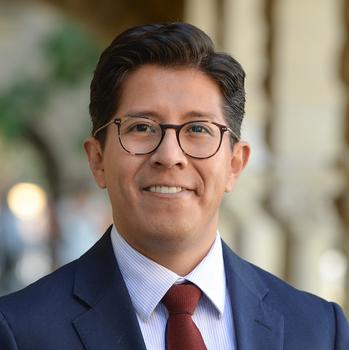In This Story

In the early 1960s, Latin American countries were deeply concerned about the growing dangers of nuclear weapons. Like many other nations, they wanted to prevent the spread of nuclear arms and reduce the risks of a nuclear war, including transit of weapons by other, more developed nations.
This led to the creation of a regional agreement to ban nuclear weapons in their part of the world known as the Tlatelolco Treaty, which established Latin America and the Caribbean as a Nuclear-Weapon Free Zone (NWFZ).
In February, on the 58th anniversary of the signing of the treaty, Schar School of Policy and Government at George Mason University assistant professor J. Luis Rodriguez and coauthor Elizabeth Mendenhall of the University of Rhode Island were presented with the inaugural Antônio Augusto Cançado Trindade Award for Nuclear Disarmament and Nonproliferation research.
Rodriguez and Mendenhall received the award for their paper about the treaty, “Nuclear Weapon-Free Zones and the Issue of Maritime Transit in Latin America,” published in May 2022 in International Affairs. The authors study the original negotiations for the Latin American zone, documenting successful coordination efforts to overcome power imbalance in international negotiations. Read the award-winning study in International Affairs on this page.
The award was presented by the international organization enforcing the Latin American decision not to obtain nuclear weapons, the Organization for the Prohibition of Nuclear Weapons in Latin America and the Caribbean (OPANAL).
“Tlatelolco was the first international law to define and prohibit nuclear weapons and inspired the creation of other nuclear-free zones in the South Pacific, Southeast Asia, Africa, and Central Asia,” Rodriguez said. “Today, these five zones represent 116 nations and encompass more than 50 percent of the planet’s surface.”
The award is the most recent of Rodriguez’s academic accolades. In May, he was presented with the inaugural Martin J. Sherwin Fellowship by the Woodrow Wilson Center for Scholars for his work there in the field of nuclear proliferation. The recognition is named for the coauthor of the Pulitzer Prize-winning biography of J. Robert Oppenheimer, American Prometheus: The Triumph and Tragedy of J. Robert Oppenheimer.
Rodriguez, who specializes in global governance and nuclear arms control, is one of the first faculty members appointed to the Schar School’s new undergraduate International Security and Law bachelor of arts degree program.
The International Security and Law major is a one-of-kind degree program that prepares graduates to become leaders when they are needed most: in the face of crisis. This dynamic program combines national and international security and law and is designed to help students understand how to most effectively respond to crises—from weather disasters to cyber-attacks to nuclear proliferation and more.
